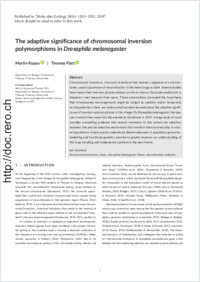The adaptive significance of chromosomal inversion polymorphisms in Drosophila melanogaster
- Kapun, Martin Department of Biology, University of Fribourg, Switzerland
- Flatt, Thomas Department of Biology, University of Fribourg, Switzerland
-
2019
Published in:
- Molecular Ecology. - 2019, vol. 28, no. 6, p. 1263–1282
English
Chromosomal inversions, structural mutations that reverse a segment of a chromosome, cause suppression of recombination in the heterozygous state. Several studies have shown that inversion polymorphisms can form clines or fluctuate predictably in frequency over seasonal time spans. These observations prompted the hypothesis that chromosomal rearrangements might be subject to spatially and/or temporally varying selection. Here, we review what has been learned about the adaptive significance of inversion polymorphisms in the vinegar fly Drosophila melanogaster, the species in which they were first discovered by Sturtevant in 1917. A large body of work provides compelling evidence that several inversions in this system are adaptive; however, the precise selective mechanisms that maintain them polymorphic in natural populations remain poorly understood. Recent advances in population genomics, modelling and functional genetics promise to greatly improve our understanding of this long‐standing and fundamental problem in the near future.
- Faculty
- Faculté des sciences et de médecine
- Department
- Département de Biologie
- Language
-
- English
- Classification
- Biological sciences
- License
-
License undefined
- Identifiers
-
- RERO DOC 324630
- DOI 10.1111/mec.14871
- Persistent URL
- https://folia.unifr.ch/unifr/documents/307824
Other files
Statistics
Document views: 151
File downloads:
- pdf: 335
- Legends for tables: 44
- Table S1: 57
- Table S2: 52

